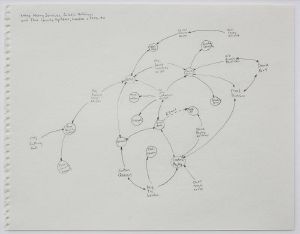Iremnurtokac (talk | contribs) No edit summary |
|||
| Line 55: | Line 55: | ||
*[[/Grit Lieder|Grit Lieder]] | *[[/Grit Lieder|Grit Lieder]] | ||
*[[/Julius Baars|Julius Baars]] | *[[/Julius Baars|Julius Baars]] | ||
*[[/Yasemin | *[[/Yasemin Yağcı|Yasemin Yağcı]] | ||
*[[/Sebastian Chiriboga|Sebastian Chiriboga]] | *[[/Sebastian Chiriboga|Sebastian Chiriboga]] | ||
*[[/Adam Streicher|Adam Streicher]] | *[[/Adam Streicher|Adam Streicher]] | ||
Revision as of 17:11, 10 May 2017
Lecturer: Mindaugas Gapševičius
Credits: 6 ECTS, 4 SWS
Date: Wednesdays 17:00-20:30
Venue: Performance Plattform, Digital Bauhaus Lab (Raum 001)
First meeting: Wednesday, 12th of April 17:00-20:30
The (In)Visible Networks course is foreseen for developing interactive projects around the video tracking system. The developed projects will connect people and objects into the single system of integrating actors and actants. During the course we will take a look at the interactive artworks, think of their implementations and different uses. What interaction strategies could be used in the hierarchical system? What pros and cons give us a distributed system? How actors/actants of different nature interact with each other?
Instead of focusing on a single programming environment, we will rather focus on OSC (Open Sound Protocol) protocol enabling interactions between machines and applications of different types. In parallel we will take a look into the terminal use (Windows, Mac), computer network protocols (internet, wireless, routing) and theoretical frameworks (ANT, IoT).
Related projects
- Mark Lombardi /Global Networks and Power Relations series (70s-90s)
- martin howse /artificial paradises (2002)
- Minority Report's (2002) gesture-based user interface
- myron krueger (70s-90s)
- golan levin /Messa di Voce (Performance version, 2003)
- abraham ornelas aispuro @ Performance platform (2016)
- Maria Lopez Valdez @ the Exhibition shared matters (2017)
- miga /Mailia (2006)
- miga /0.30402944246776265 (2013-2015)
Syllabus
- 12.04.2017 Systems
- 19.04.2017 Networks
- 26.04.2017 Unity and Pd
- 03.05.2017 Captury, Unity, and Pd (simulation + debug)
- 10.05.2017 Captury, Pd, graphics, multi speaker sound
Hardware
- Linux, Mac, Windows
- Objects
- Humans, other living organisms
- Sound system
- Video wall
- video tracking system
Software
- Unity 3d, Unreal Engine
- captury
- Zirkonium
- Pure data, Max
- Processing
- mobmuplat, touchOSC
- OSCulator https://osculator.net
OSC protocol
"Open Sound Control (OSC) is a protocol for communication among computers, sound synthesizers, and other multimedia devices that is optimized for modern networking technology. Bringing the benefits of modern networking technology to the world of electronic musical instruments, OSC's advantages include interoperability, accuracy, flexibility, and enhanced organization and documentation." (http://opensoundcontrol.org/introduction-osc)
Students
Tutorials
Grading
50 % Technical/Aesthetic implementation of the projects
20 % Individual/Group Work
30 % Documentation including 10% of updates in Wiki
Eligible Participants
Undergraduates and graduates enrolled in the faculties of Media and Design.
